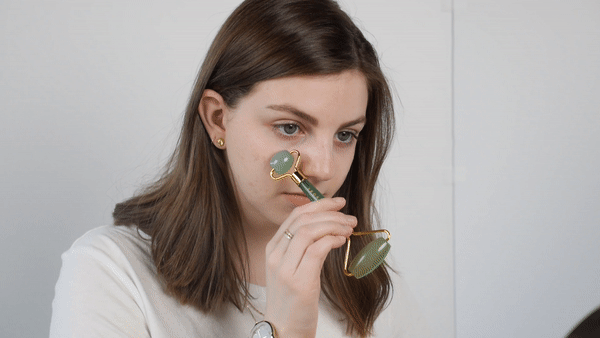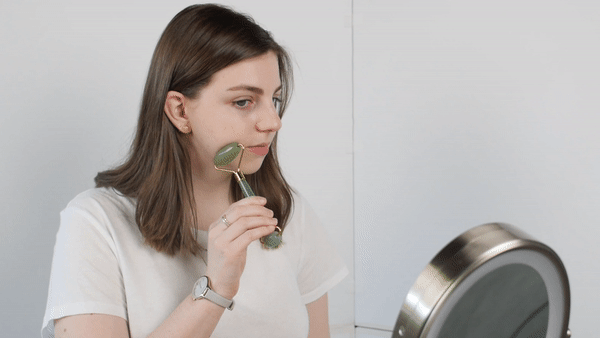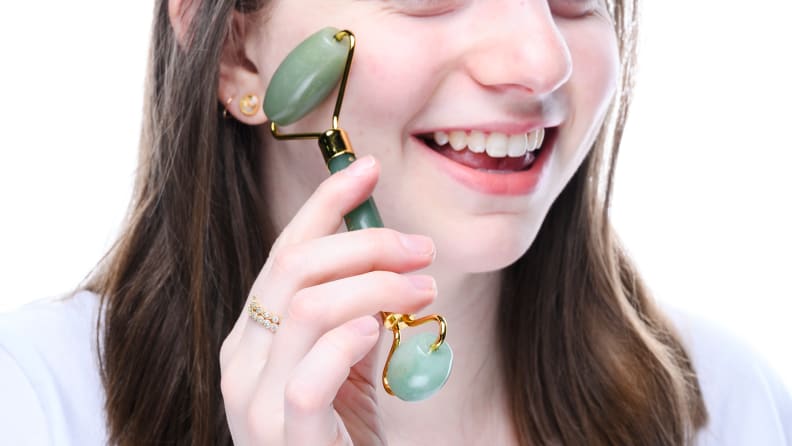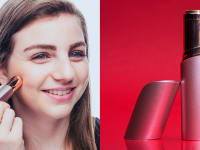People are obsessed with jade rollers—here's the truth about them
Experts tell us what is real about this skincare trend.
Products are chosen independently by our editors. Purchases made through our links may earn us a commission.
Beauty bloggers looking for a holistic approach to skin treatment are embracing the practice of jade rolling, a surprisingly traditional skincare method. And this trend goes way back: Jade rollers date back to the Qing Dynasty, as an integral beauty tool for wealthy Chinese people of the 17th century. Beauty influencers looking to revive the long-lost trend have suggested jade's mystical "healing" attributes as a reason to use the tool.
The first thing you should know: These tools aren’t made of real jade. At least, not the ones typically found in a Sephora or on Amazon.
Authentic jade is highly sought after for jewelry and consequently very expensive, explains Raquel Alonso-Perez, a curator at the Mineralogical and Geological Museum at Harvard University. "Natural, undyed or untreated [jade]... would be in the thousands of dollars," says Richard Berberian, the owner of Elyse Fine Jewelers-Gemologist in Reading, Mass.
The tools sold by mass retailers for around $10 to $40 are likely made of other similarly-colored stones, such as aventurine quartz (also called aventurine jade), bowenite serpentine, or dyed marble. These jade imposters boast similar physical qualities, like a cool and smooth exterior, but in much more affordable materials.
What is a jade roller?

Even though there's no real jade involved, the term "jade roller" has become standardized name for these tools. The roller itself mimics a mini paint roller, but where the foam would go is a smooth stone. When in use, the stone glides over the face the way you’d apply paint onto a wall.
Jade, or jade simulants, are the more popular facial rollers seen on Instagram and YouTube but rollers can be made of other stones, such as amethyst or rose quartz. (And don't worry about the legitimacy of those stones. Harvard gemologist Alonso-Perez says they are likely authentic.).
How do you use a jade roller?

With a clean jade roller, start in the center of a freshly washed face and work outward and upward toward the edges. As with most skincare application methods, it’s best to work against gravity and avoid tugging at the skin.
You can use the same rolling technique to massage in your favorite cream or serum—just clean the roller when you’re done.
Stick the roller in the fridge prior to use if you want the stone to feel extra cold to the touch. This feels great under the eyes.
What do people claim it does?

Jade roller fans (and manufacturers) link the tools to many skin benefits, including: helping lymphatic drainage (the flushing of toxins through tiny vessels under the skin); smoothing wrinkles; tightening pores; and boosting collagen to help with the skin’s elasticity. Another claim is that using a facial roller immediately after applying skincare creams or serums helps the active ingredients penetrate deeper into the skin.
Can it do all that it claims to?

There are no scientific studies to support the efficacy of jade rolling as an anti-aging tool or its long-term benefits, says Dr. Tsippora Shainhouse, a board-certified cosmetic and medical dermatologist based in Los Angeles.
But that doesn’t mean you won’t notice any positives, however temporary. “Most of the benefits of jade rolling come from the application of cold to the skin, which can help to constrict blood vessels and calm the skin, making it look less red and inflamed,” says Shainhouse. Even simpler, Shainhouse says the repetitive motion relaxes the muscles and feels soothing.
As for whether jade rolling makes facial creams work better, Dr. Suzanne Friedler, a board-certified fellow of the American Academy of Dermatology based in New York City, says that could be a benefit, although the result would be due to the movement of the roller, not the type of stone. “Anytime you’re massaging in an ingredient, it may enhance the penetration,” she says.
What can jade rollers not do?

Crystals are certainly having a moment, but there is no scientific evidence to support that jade, its simulants, or other stones used for rollers metaphysically enhance their owners.
Claims that jade rolling boosts collagen growth or erases wrinkles are also unfounded. Ultimately, the tool reveals a temporarily de-puffed, glowing complexion and helps active ingredients penetrate deeper into the skin. Any other benefits are subjective.
Should you use one anyway?

If you enjoy how it feels, go for it! I use a $30 jade roller from Sephora at night after washing and moisturizing my face. The cool, smooth stone feels especially great after a hot shower. It’s a small way for me to pamper myself and my skin before bed. You could give yourself a similar massage using your fingers, but the cooling sensation is the real treat here.
And while science doesn’t fully support the claims, that doesn’t make it useless. “[A jade roller] can be a relaxing, stress-relieving, and ‘de-puffing’ tool that makes you feel good,” Shainhouse said. “Which will, in turn, help you look good.”


